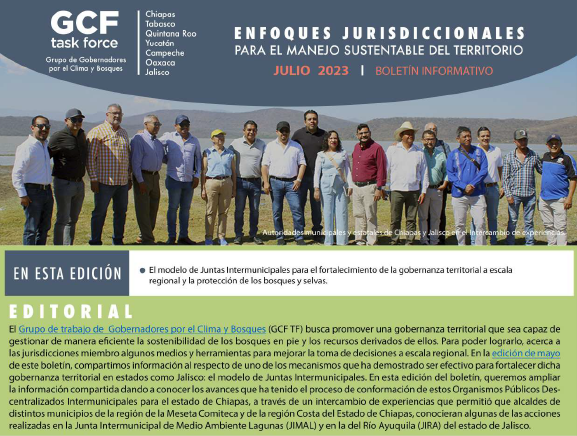The Governors’ Climate and Forests Task Force (GCF Task Force) works to support progress in creating Decentralized Public Municipal Bodies (e.g., Intermunicipal Boards) in the state of Chiapas, through an exchange of experiences that allowed mayors from different municipalities in the Meseta Comiteca region and the coastal region of the state of Chiapas to learn about some of the actions carried out by the Lagunas Municipal Environmental Board (JIMAL) and the Ayuquila River Environmental Board (JIRA) in the state of Jalisco.
Please see here for the full July newsletter from our Coordinating Partner in Mexico, Pronatura Sur, outlining these important and ongoing efforts. See below for the English Translation.
Model of Intermunicipal Boards for the strengthening of territorial governance at the regional scale and the protection of forests and jungles.
With the objective of deepening the scope and importance of having a territorial governance model at the regional scale, the process of promoting Intermunicipal Boards for Chiapas has involved a strategic accompaniment carried out by specialists in the subject. This accompaniment has also sought to dialogue with the experiences of other jurisdictions, such as the state of Jalisco, which currently has 11 active Intermunicipal Boards that promote efficient and participatory management of resources at the local level.
In this sense, Pronatura Sur, the Ministry of Environment and Natural History of the state of Chiapas (SEMAHN) and the Ministry of Environment and Territorial Development (SEMADET) of the state of Jalisco, have been able to work in a coordinated manner thanks to the support of the GCF Task Force, to strengthen the strategy for promoting Intermunicipal Boards for Chiapas. Thus, through an exchange of experiences that brought together mayors from the Chiapas municipalities of Tonalá, Arriaga, Pijijiapan, Mapastepec, Comitán and Socoltenango, the form of organization, collaboration and joint decision-making derived from the model of Intermunicipal Boards was promoted. This model has the potential to generate numerous benefits for the care of the territory, the forests and jungles, and the quality of life.
The first day of activities began with a visit to the Junta Intermunicipal de Medio Ambiente Lagunas (JIMAL), where the mayors learned about the actions taken to rescue the Atotonilco Lagoon and had a peer-to-peer discussion with the representatives of the municipalities of Amacueca and Villa Corona, followed by a visit to the Sistema Intermunicipal para el Manejo de Residuos SIMAR- Lagunas. For Natividad de los Santos, Municipal President of Tonalá, this visit demonstrated that the model of Intermunicipal Boards fosters collaboration and cooperation between municipalities that share common challenges and objectives. Inspired by what was shared with them during this day, he mentioned that the possibility of meeting with representatives from different localities, besides promoting the exchange of ideas, knowledge and good practices, allows finding ways to jointly face some regional challenges of territorial planning, such as the construction of a sanitary landfill for the municipality he represents, together with the municipality of Arriaga.
On the second day they visited the Junta lntermunicipal del Río Ayuquila (JIRA), their first stop was in the Municipality of Limón, where they learned about the experience of producers of Silvopastoral Livestock Systems. They were also able to meet with the Municipal Presidents of Autlán and Unión de Tulá, with whom they shared ideas and heard about their management experiences on a regional scale. One of the most important reflections shared this day was that in the context of the livestock activity in Chiapas, a model of Municipal Boards can contribute to the strengthening of an adequate management of the landscape, through institutional arrangements that promote good livestock and land management practices, in order to reduce greenhouse gas emissions.
Carlos Albores, Municipal President of Pijijiapan, mentioned that “the Intermunicipal Boards will allow environmental issues to have continuity regardless of the time in office that a Municipal President may have.” To this end, they will seek to involve representatives of civil society and community organizations in order to have a greater diversity of perspectives that will strengthen the legitimacy of the decisions made and encourage citizen participation.
Elmer Nicolás Noriega, Municipal President of Mapastepec, spoke about one of the most challenging aspects of the organization and coordination between municipalities: the ability to reach agreements. In order to promote and consolidate actions of regional interest, it will be necessary to have governance tools that strengthen the management of funds to optimize public investment and expand benefits for the communities.
It is hoped that this exchange of experiences will contribute to the consolidation of an effective organizational mechanism for the state of Chiapas, which will strengthen territorial governance and continue to promote sustainable development for the state. As such, “the Intermunicipal Boards are a model to follow, coming here and seeing all this work means a hopeful renewal for us in relation to what we want to do in the future,” said the head of SEMAHN, María del Rosario Bonifaz Alfonzo.
Pronatura Sur documented in a video the highlights and impressions of the mayors of Chiapas during this exchange of experiences, which you can watch at the following link https://www.youtube.com/watch?v=Bx7dqEq53iI.

